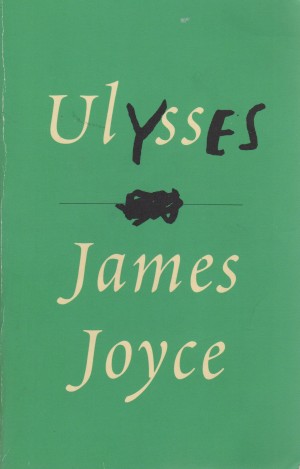 Ulysses by James Joyce (1990. Vintage Classics Edition. ISBN 9780679722762)
Ulysses by James Joyce (1990. Vintage Classics Edition. ISBN 9780679722762)
October 4, 2014 through July 26, 2015. That’s how long it took me to plow through Joyce’s so-called “masterpiece” of modernist fiction. I’m sorry, but I must be a dullard, a low intellect, a stupid person. There were, throughout the book (supposedly a chronicle of one day in the life of Dublin advertising agent, Leopold Bloom) moments of clarity where I almost understood what the author was trying to portray or explain. And then there were great long passages of nonsensical gibberish, such as the “dream sequence” written in the form of a script for a very confused and poorly executed stage play. The portion of the book that frustrated me the most, this imagined (I expect by Bloom as he sat drinking with his companion, Stephen Dedalus in various pubs about town after the funeral of a mutual friend) sequence, from page 429-609 in my copy of the tome, made me want to cry out in anguish, like an Irish child enduring famine. My pain was not caused by starvation of the stomach or the organs or my skin, mind you, but of the mind! I am not a scholar. I haven’t read the Odyssey since I was forced to do so by Miss Endrizzi in 11th grade English. So, to my dimwitted mind, if there is a connection between the wanderings of Bloom and Dedalus and the conniving and fornicating of Bloom’s long-suffering songstress wife, Molly, to Homer’ epic poem and its characters, it was completely lost on me.
I read to learn. I read to be entertained. And while Ulysses certainly includes references, either in dialogue or narration, to every possible topic under the sun-from physics to astronomy to Mormonism to Irish history to sex (wholesome or trysts driven by fetish)-the educational attributes of this long winded tale became a blur in my eyes and a headache for my brain. While attempting to make sense of this book, I didn’t keep a dictionary handy to decipher the language choices Joyce weaves into this meandering, mind boggling excursion. If I had looked up every term, every word I didn’t recognize, I would still be trudging through the first one-third of the book a full ten months after I began my reading quest!
I will say this: The unusual, experimental style that Joyce ends the book with-sentences that never end and a complete dearth of punctuation and capitalization-told as it was from the perspective of Molly Bloom, was the most entertaining and intriguing part of the novel. I felt some small measure, as a dogged reader trying to understand and follow Joyce’s various slights of hand that led, in slow, agonizing succession, down literary blind alley after blind alley, of success when I read that last section of the book and came to finally understand Molly Bloom’s perspective regarding a once blissful life lost to domestic drudgery. The ending and the beginning, where we meet young Dedalus, are the only portions of the novel I have any recollection of or appreciation for. The five hundred pages in between? Forgettable, like a bad hangover.
Oh. Just so you know. I’ll not be attempting to navigate through the (reportedly) even more difficult waters of Finnigan’s Wake. I’ve already wasted enough valuable reading time on a story that makes no sense and brought me only the slimmest of enjoyment.
2 stars out of 5. Not a book to read for enjoyment.
Peace.
Mark


